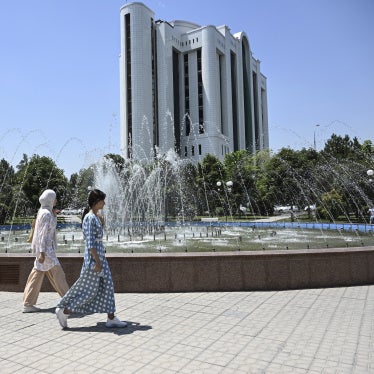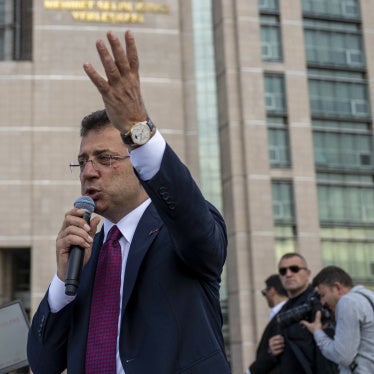President Ilham Aliyev
19 Istiqlaliyyat Street
Baku 370066, Azerbaijan
Dear President Aliyev,
I am writing to express our profound concerns about the proposed amendments to the Law on Non-governmental Organizations (Public Associations and Foundations) that has been submitted to the Milli Majlis. The draft in its current form violates Azerbaijan's human rights obligations on freedom of association and if adopted would represent a significant setback in Azerbaijan's democratization process. We urge you to take immediate steps to suspend parliament's consideration of the current draft and to ensure that any new amendments to legislation regulating NGO activities are in conformity with Azerbaijan's international human rights obligations on freedom of association. We also urge you to encourage the parliament to send the current and future draft amendments on the NGO law to the Council of Europe's Venice Commission for review and to reflect the commission's substantive comments in any new draft amendments.
The draft amendments contain serious shortcomings and contradict provisions of the International Covenant on Civil and Political Rights (ICCPR), and the European Convention on Protection of Human Rights and Fundamental Freedoms (ECHR) relating to freedom of association. Azerbaijan is a party to both instruments and bound by their provisions. The amendments also run counter to the Recommendation of the Council of Europe Committee of Ministers to Member States on the Legal Status of Non-governmental organizations in Europe and the Fundamental Principles on the Status of Non-governmental Organizations in Europe.
Article 22 of the ICCPR states that everyone has the right to freedom of association. The only permissible restrictions to this right are those that are "prescribed by law and are necessary in a democratic society in the interests of national security or public safety, public order (ordre public), the protection of public health or morals or the protection of the rights and freedoms of others." Article 11 of the ECHR contains almost identical language about the freedom of association and the limitations.
Any state has the right to regulate, and even set restrictions on, NGOs, but it can do so only in pursuit of a legitimate aim, if it is considered necessary in a democratic society, and then in a manner which is non-discriminatory and proportionate to the aim being pursued. Any restrictions must also be sufficiently clear so that those subject to them can reasonably know how to comply.
The proposed amendments, however, would impose unreasonable restrictions on freedom of association in Azerbaijan that do not meet the tests of necessity for a democratic society or of proportionality and clarity. If adopted they would unreasonably hinder the free operation of local and foreign NGOs in the country. Among the most serious shortcomings with the proposed amendments are its provisions that would ban:
- NGOs from receiving more than 50 percent of their funding from abroad (Article 24.2). Foreign funding is a crucial source of support to Azerbaijan's NGO community. Because of the lack of local funding sources many NGOs in Azerbaijan rely exclusively on external funding. The proposed restriction may effectively strip such NGOs of resources, lead to their closure, and thus restrict the right to association. Moreover, it runs counter to para. 14 of the Council of Europe Committee of Ministers recommendation, which states that "NGOs should be free to solicit and receive funding ... not only from public bodies in their state but also from institutional or individual donors, another state or multilateral agencies."
- Any activities of unregistered NGOs (Articles 16.4. and 16.5). The amendments would impose administrative sanctions on individuals acting on behalf of an unregistered NGO functioning, and provide for an unregistered NGO to be banned by a court if it continues to operate without state registration. The United Nations Human Rights Committee, which monitors the compliance of states-party to the ICCPR with the provisions of the covenant, has repeatedly stated that mandatory registration of civil society organizations violate Article 22 of the ICCPR.[1] The Council of Europe's Committee of Ministers has made the same conclusion: "NGOs can be either informal bodies or organizations or ones which have legal personality."[2]
- The founding of NGOs by persons who are not permanent residents of Azerbaijan and persons without citizenship (Article 9.4). This provision also violates Azerbaijan's ECHR commitments, which grants fundamental rights, including to freedom of association, to "everyone within the jurisdiction" of the member-states. The provision is discriminatory and in violation of Azerbaijan's own constitution, which guarantees equality of rights and liberties to everyone, irrespective of their nationality (Article 25.3). The International Center for Not-for-Profit Law, an expert organization that promotes a legal environment conducive to civil society and public participation, has noted in its analysis of the draft amendments European Court of Human Rights rulings finding that discriminatory treatment of foreign organizations constitutes a violation of the right to association. In a 2006 case against Russia, for example, the court found "no reasonable and objective justification for a difference in treatment of Russian and foreign nationals from being founders of Russian religious organizations."[3]
- NGO activity in districts of the country outside of the place where the NGO is registered, unless it has branches and/or representations in one-third of Azerbaijan's 59 administrative-territorial regions (Article 6.2). The Council of Europe Expert Council on NGO law has found that such requirements "create barriers for the choice of level of operation, which are not consistent with the Committee of Ministers' Recommendation and appear to be unnecessarily restrictive of the freedom of establishment, as well as of the freedom of the governing body to determine the administrative structure of an organization."
- Foreign NGO activities without state registration, which can only be granted if a "relevant international agreement signed with such states exists" (Articles 7.7, 12.5, and 16.2). The draft amendments prohibit foreign organizations from opening branches or representative offices that are financed by foreign states, organizations, or individuals unless Azerbaijan has an international agreement with that organization's home state. The provisions do not specify the type or character of such an agreement. Many countries require registration of representative offices of foreign organizations, but their activities should not be linked to bilateral agreements between the state actors.
- The founding of a new NGO by founders of non-governmental organizations that have been "liquidated, due to violations of the law." (Article 9.3). The amendments would authorize the courts to ban such individuals for up to five years from founding another organization. This restriction appears overly harsh and could have extensive, negative consequences for NGO work in Azerbaijan. In at least one case in recent years, the Election Monitoring Center (EMC) in 2008 was closed for minor, administrative reasons: for giving inaccurate information about its founders and legal address. The draft law would ban the EMC's founder from filing another application for registration for possibly five years, a sanction disproportionate to the administrative violation. As described above, proposed amendments 16.4 and 16.5 would effectively ban the organization'swork as an unregistered NGO.
The draft amendments also contain provisions establishing onerous reporting requirements. Proposed article 29.4 would increase the reporting burden on NGOs by requiring them to prepare and submit annual financial reports and auditor's reports, in addition to existing tax reporting requirements. The proposed amendment would give the government very broad discretion to oversee and control NGOs in a manner that is far greater than what is provided for in the Council of Europe's Fundamental Principles, which envisions only annual reports and balance sheets.[4]
Under proposed article 31.6, failure to submit such reports can result in a warning. Should an NGO fail to submit required reports within 30 days of a warning, the relevant government authority can appeal to a court for its liquidation. This is a sanction that is disproportionate to the violation. It contravenes the Council of Europe Fundamental Principles' guideline that all sanctions imposed upon NGOs must be proportionate to the violation and that dissolution should be considered a last resort.[5] Such disproportionate sanctions and the ease with which an NGO could potentially be dissolved are also incompatible with the level of protection afforded to the right of association under human rights law. Furthermore, as ICNL has noted in its analysis of the draft amendments, "This sanction is much more severe than that imposed on commercial organizations that fail to report. By comparison, failure to submit financial reports under the Azerbaijan Code on Administrative offences is punishable by fines,[6] not by liquidation of a legal entity".
Finally, the draft amendments provide for ambiguous government executive oversight mechanisms (Article 29.5). As ICNL has noted, "The unbounded discretion provided by Article 29.5 gives no guidance to implementing officials as to any limitations on the ability of officials to demand documents or carry out control over NGOs' activity, and could be subject to abuse."
Taken together, the proposed amendments would impose unnecessary restrictions on the registration and operation of local and international civil society groups. When viewed in the context of a deteriorated media situation in the country, the proposed amendments appear intended to stifle Azerbaijan's vibrant civil society.
We urge you to take immediate and appropriate steps to reject any arbitrary limitations on the work of independent civil society groups and instead empower NGOs to enhance the prominent and constructive role they have played in Azerbaijan's public life.
Thank you for your attention to this urgent matter and we look forward to continued engagement with the Azerbaijan's government.
Sincerely,
Holly Cartner
Executive Director
Human Rights Watch
[1] Lebanon, ICCPR, A/52/40 vol. I (1997) 53 at paras. 357 and 358; Lithuania, ICCPR, A/53/40 vol. I (1998) 30 at para. 177.
[2] Recommendation CM/Rec(2007)14 of the Committee of Ministers to member states on the legal status of non-governmental organisations in Europe, adopted by the Committee of Ministers on 10 October 2007 at the 1006th meeting of the Ministers' Deputies.
[3] Moscow Branch of the Salvation Army v. Russia, October 5, 2006, para. 86.
[4] Fundamental Principles, art. 60.
[5] Fundamental Principles, arts. 70 and 71.
[6] Article 247-1 of the Azerbaijan Code on Administrative offences.








